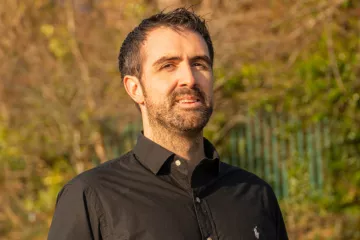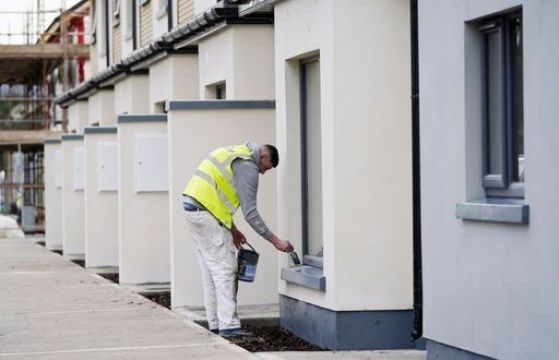While lack of supply is often cited as the main issue in the Irish housing market, a mortgage broker has said the real issue is inflation and that this will become evident in 2022.
John Fahy, CEO of Dublin-based Pangea Mortgages, told BreakingNews.ie: "A lot of people are talking about the supply of houses being the number one thing driving price, we absolutely don’t believe that, the evidence isn’t there to support that.
"If you go back, house prices pre-Covid were falling in parts of Dublin and the nationwide trend was falling as well, so we’ve had a supply shortage since 2015 or 2016."
The amount of money in circulation has increased massively over the last two years as pandemic payments were made to businesses and individuals, both from an Irish perspective and globally.
Mr Fahy feels this is what is driving house prices up, and he predicts it will continue this way over the course of the year.
Interest rates
"We can already see interest rates begin to creep up in the wholesale markets, in the US government interest rates are creeping up as well, this will be the biggest driver of the market is what happens with interest rates. We believe there’s a high probability that interest rates need to go up quite quickly, far more than what’s being predicted, so you could get 1.5-2 per cent within 12-18 months. That will change the dynamics of the housing market.
"In the Eurozone now, we have records, the highest inflation ever. That’s not the result of temporary lockdowns or the Suez Canal issues and stuff like that, the primary reason is the amount of money that’s been put into the economy. I think the big story of this year is that inflation is going to continue to increase and eventually rates could have to get jacked pretty high and that’s going to have real implications for people’s mortgages.
"If I were to give you 10 things I think are going to drive the market, nine of them would be inflation and supply might be the 10th.
"It is those inflation rates that will be a massive, massive problem. Inflation rates are driving the cost of construction, which in turn is driving house prices so high, that would be the big thing. That won’t ease it’s going to get worse."
He added: "At its simplest, if you have an amount of money and an amount of goods in an economy and overnight effectively 20 per cent more money comes into play the logic is the cost of the stuff goes up by an average of 20 per cent, that’s what you’ve seen happen.
"It’s starting to hit wages now, everyone has a story of people struggling to fill jobs, a big one in this country will be public sector unions looking for inflation busting pay increases, that’s 6,7,8 per cent. They’ve already said they’ll be looking for that. That’s when inflation gets away from you, when you have these increases in pay, that’s very much what we’re expecting this year.

"A lot of what we’ve been trying to do in the last month or so with our customers is focused on thinking long-term. We’ve been blessed that a number of lenders have come on to the market with long-term rates and I would guess the vast majority of customers have never heard of the majority of these institutions. Avant Money and Finance Ireland would be the main two, these are offering between 10 and 30 year fixeds, so you fix your entire mortgage, we’re encouraging our customers down this route.
"The financial impact of raising rates, say you have a €300,000 mortgage over 30 years, and you’re on about 2.5 per cent, standard now, if those rates were to rise to historical averages, 5.5 per cent, that would cost you €190,000 over 30 years. I don’t think enough people are really aware of the impact that normalising rates, not even sky-high rates, the impact that this will have on them is substantial, that’s our number one, two and three concerns this year."
In the Dáil on Tuesday, Taoiseach Micheál Martin was accused of “not living in the real world” amid warnings of long-term inflation hitting people’s pockets.
Cost of living
Sinn Féin leader Mary Lou McDonald told the Fianna Fáil leader the cost of living has become “unbearable”, and accused the coalition Government of lacking urgency on the issue.
Potential buyers may find the current state of the housing market intimidating, but Mr Fahy feels this is as good a time to buy as any, especially for those who may be waiting for a drop in house prices.
He said long-term interest rates can help first-time buyers, and those who are looking to switch their mortgage.
"We’ve had too many people saying they’re going to wait until house prices fall, they may be able to afford to buy but wait for this magic moment that never comes, and in a year’s time they’ve gone from being able to afford to buy to being priced out of the market, we would say if you’re in a position, and you want to, go ahead but the key thing to consider is that you get long-term interest rates, so you’re not exposed to rising rates in the next three or four years.
"There’s no sign in the first half of the year that house prices will do anything but continue on a double-digit growth rate.
First-time buyers
"We always tell first-time buyers preparation is key. Banks will look at the last six months of your documents, your current account for example, and that’s what they consider in the application so what you want to be thinking is get the mortgage process started a long way in advance of you actually going and bidding on properties. To many first-time buyers, the first thing they do is go on Daft and try to book viewings, when in reality the first thing they should be doing is getting their finances in order, ensuring their accounts are correct and knowing exactly how much they have to bid with. Too many people will jump in at the purchasing end, then sale agreed and uh-oh, they can’t get a mortgage.
"Preparation will also tell them what’s in the market, they need to be thinking about longer term rates, and then simply educating themselves on the lenders who are out there, and what rates are available."
Pangea Mortgages works on a digital-first model and Mr Fahy said switching mortgages is a good option for people, which is often ignored because they see it as too complex.
"The amount of money you can save from switching a mortgage versus the percentage of people who were actually doing it, it was a huge mismatch, the hassle and effort was what put people off. Now that you’re seeing those barriers removed there are more and more people switching," he explained.







